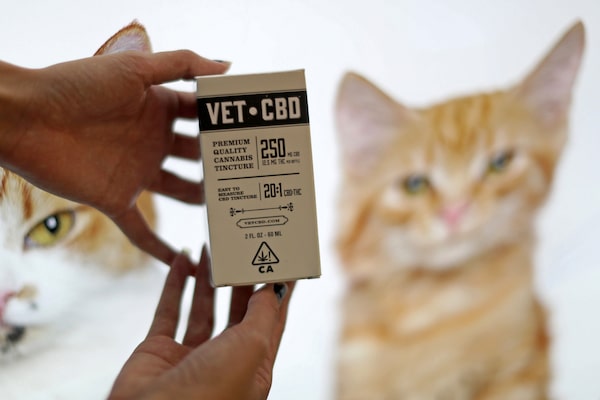
The Vet CBD Pet Cannabis Company booth is seen at CatCon in Pasadena, California, U.S. Aug. 5, 2018.LUCY NICHOLSON/Reuters
Many Canadians are anxiously awaiting the legalization of cannabis on Wednesday, but a segment of the population is left out when it comes to accessing the medicinal benefits of cannabis: our pets, pet owners and their veterinarians.
Currently, there are no guidelines or legal pathways for Canadian veterinarians to authorize or safely dispense cannabis for therapeutic use in animals – despite mounting evidence that some cannabis products can help treat a range of ailments in pets. Some provinces actually prohibit veterinarians from discussing cannabis as a treatment option with pet owners.
The implications for pets and pet owners are troubling. With the growing popularity of medical cannabis for people suffering from pain, more pet owners today are naively administering unregulated, over-the-counter dispensary cannabis to their pets, sometimes with dire consequences. Veterinary hospitals are reporting an alarming increase in the number of dogs and cats admitted with symptoms of marijuana toxicosis after being given cannabis products from well-intentioned pet owners. The situation is so alarming that the Canadian Veterinary Medical Association (CVMA) recently urged Ottawa to include warning labels on cannabis products to protect pets.
Cannabis-based pet therapy can be safe and effective. Over the past eight years, I’ve witnessed hundreds of patients respond well to formulations of cannabidiol (CBD). Patients with a variety of ailments, everything from cancer to anxiety issues, have benefited from CBD – some with absolutely remarkable results.
My introduction to cannabis as a therapeutic option came in the form of a 16-year-old cat with multiple diseases, chronic pancreatitis and arthritis. He was on a number of medications, including opioids, to keep him comfortable. The combination made him nauseous and did not manage his pain well. We discussed euthanasia due to his poor quality of life, but his owner, who worked with a Vancouver compassion club, suggested CBD. After researching various formulations, we experimented with very low doses. The cat thrived and lived two more good years. Since then, I have been a vocal advocate for cannabis-based therapy for animals.
While there’s much anecdotal evidence showing that cannabis can provide relief for animals suffering from a variety of conditions, critics correctly argue that there is little clinical research available demonstrating the effectiveness and safety of CBD in different animal species. Fortunately, that is changing as we move to legalization and veterinarians are allowed to research cannabis. Several promising clinical trials have been conducted this year looking at the benefits of CBD in dogs with arthritis and dogs with seizure disorders (at Cornell University College and Colorado State University). Closer to home, the Veterinary Drug Directorate of Health Canada recently authorized a research study on the effectiveness of CBD to treat anxiety in dogs.
The veterinary community has recently become more vocal about the therapeutic implications of cannabis. The CVMA believes veterinarians “should be able to recommend specific products and provide dosing guidelines for cannabis products available legally under the Cannabis Act.” In addition, the CVMA is working with the Canadian Association of Veterinary Cannabinoid Medicine in lobbying Health Canada to amend the Access to Cannabis for Medical Purposes Regulations to include veterinarians and classify CBD as a veterinary health product, so that products can be specifically formulated for the unique needs of pets.
As the evidence continues to grow about the benefits of cannabis for companion animals, numerous companies have entered the cannabis-for-pets market. I recently joined one of them (True Leaf) to bring legal, safe, quality-controlled hemp-seed-based and CBD products for pets to the market.
Pet owners considering administering cannabis to their pet must first consult with their veterinarian. The best option is to start with a hemp-seed-based product which is legally compliant and has negligible CBD and THC content. Until there are other legal and quality-controlled cannabis pet products, pet owners should proceed cautiously. Products should clearly state the cannabinoid potency and should carry a certificate of analysis from the manufacturer identifying all contents, including any residual traces of pesticides, solvents or other contaminants.
Carefully administered cannabis-based pet therapy under the direction of a veterinarian can significantly improve an aging animal’s quality of life. I have pledged and dedicated my life to promoting animal health and alleviating animal suffering. The potential of cannabis-based medicine allows veterinarians to do just that and return the love to our beloved pets.
Katherine Kramer is a veterinarian, chair of True Leaf Medicine International Ltd.’s Veterinary Advisory Board and medical director at the VCA Canada Vancouver Animal Wellness Hospital.